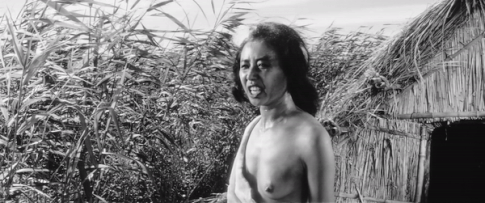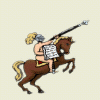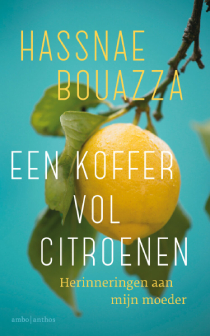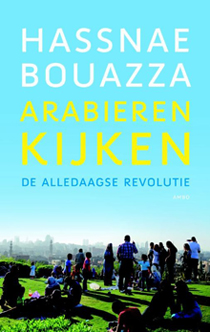‘Jews and Christians were seen as Muslims’
Tayfun Balçik

Scene from Onibaba (watch it in its entirety here)
Earlier this month blogger and historian Tayfun Balçik interviewed Bangladeshi writer and activist Parvez Alam in front of a live audience as part of the The Hague Peace Projects. Alam is an expert in the history of Islam, especially the historical development of Islam. During the talk, a transcription of which will be published in three installments, several subjects were explored, like the relationship between Arab nationalism and Islam and the roots of the Sunni-Shia divisions.
Since when are you here in The Netherlands and what are you doing for The Hague Peace Projects?
“Since the end of 2015. I’m connected with The Hague Peace Projects since the Bangladesh Book Fair from february 2016. We have a Bangladesh project going on for Internet-bloggers.”
Do you like The Netherlands?
“I don’t like the whole rainy thing.”
(laughter..)
“I come from a country where it rains a lot too. But it’s too much here sometimes.”
Okay, this is the Kurdish-Turkish workgroup of The Hague Peace Projects, but we would like to talk about other issues as well. After all, we’re not just Kurds and Turks, we’re also Dutch citizens, Muslims, secularists, and so on. Before we embark on the topic of Islam, I would like to know what you know about Turks and Kurds and our history?
“The history of Turkey is one thing that attracted me quite a lot. The first thing that comes to my mind when we talk about Kurds is of course Salahaddin, the leader who fought against the Crusaders and reclaimed Jerusalem. That’s how I got interested in the Kurdish people. Kurds are still one of the most important people in the Middle East, but they are spread over four countries, fighting for freedom. And with regards to the Turks, they were the rulers of the last empire of Islamic civilization. It was a fascinating empire.”
And about the Kurdish-Turkish relation, what do you know about that?
“Bits and pieces. About the rise of the PKK in the eighties. That earlier Kurdish national consciousness actually began with some kind of Islamism, and that it later developed into a more leftist-nationalist movement. I follow the current war in Syria, how in Rojava they became one of the main forces against Deash.”
In my conversations with you since we first met here at The Hague Peace Projects in 2016, I noticed that my own knowledge about the history of Islam was fragmented and limited, we also had conflicting views. So, let us start with the basics. Can you explain what ‘Islam’, ‘sunni’ and ‘shia’ means?
“Islam means literally ‘submission’. But in the earliest period of Islam (7th century), the meaning was a bit vague. If you ask a Sunni Muslim now about Islam, he will say that Islam stands for the five pillars of prayer, fasting, charity, the hajj pilgrimage and the shahada. But the idea that this is Islam, was compiled and codified between the 8th and 9th century. In the earliest period however it was vague. If you look at the word Islam in the Quran, most of the times it is not used there as a religion or ideology, its mostly being used with the meaning of submission, literally, submission to God.”
“Also the word ‘Muslim’, which means ‘submitter’, you’ll find in the Quran just one sentence where Muslim is seen as a separate religious community. Interestingly, previously Jews and Christian prophets and other people were also referred to as Muslim. That was the meaning of Muslim in the early period of Islam: not the identity of a new religion, but more as someone who submitted to the idea of one God. It also meant submitting to a political community that worships the one God of Abrahamic monotheistic tradition. David was for instance called a Muslim, they said that all the prophets who came before were Muslim.”
So, the first Muslims saw themselves as part of the monotheistic tradition?
“Yes, but in the earliest period, there is another peculiar thing, you see that there were at least two different groups in Muhammad’s community, in his Ummah. When Muhammad (570 – 632) fled from Meccah to Medina (622), he formed a new political community (the Ummah) with a constitution, the Medina constitution. In this constitution, the signatories were not just ‘Muslims’. You’ll find two separate words in this constitution: Mu’mins and Muslims. Mu’min means ‘believer’ and Muslim ‘submitter’. They signed the constitution of Medina as separate groups. So who were the Mu’mins? The Mu’mins are the ones you can call the ‘original Muslims’, the sahaba of the prophet, his ‘companions’.”
“Muslim on the other hand is mentioned in the Quran again when God sends a message to Muhammad about the Bedouins, the nomads of the desert. Muhammad was no nomad, he was an inhabitant of Mecca, and then the ruler of the citizens of Medina. God was saying to Muhammad: ‘tell them you have become Muslim, but not Mu’min.’ So ‘Muslim’ had a more political connotation, not necessarily religious thus. Muhammad made a lot of pacts with tribes, and they became Muslims.”
So there was a hierarchical difference between Mu’mins and Muslims?
“Yes, Mu’min were at the top. The people who migrated with Muhammad to Medina. The Mu’min stayed in power for quite some time. They were the most powerful group in the earliest period. But during the time of Uthman (third caliph, 644 – 656) and Ali (fourth caliph, 656 – 661) you can see that the ‘Muslim’ identification, the political identity of the political community, was becoming more important and would eventually become the identity of the whole religious community.”
To be continued…
English, Tayfun Balçik, 28.03.2017 @ 07:17
3 Reacties
op 28 03 2017 at 17:35 schreef Govert:
“Het grootste probleem met Nederland is de regen”
Geef die man een verblijfsvergunning. En snel een beetje!
op 30 03 2017 at 23:20 schreef Sasha Berkman:
gekke indiers :)
op 02 04 2017 at 00:41 schreef Klaas Levelt:
Ik kijk uit naar het vervolg, heel interessant!






 RSS
RSS